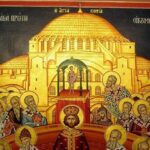The Economist’s annual global liveability index was released last month, highlighting the ‘world’s ‘most liveable’ cities. The index combines a variety of qualitative and quantitative factors across five broad categories: stability, healthcare, culture and environment, education and infrastructure, to generate its ratings. These are then ranked to find the most and the least liveable cities in the world.
According to the 2022 results, the Austrian capital Vienna is the world’s most liveable city followed by Copenhagen in Denmark and Zurich in Switzerland. Western Europe and Canada dominate the most liveable cities, filling 8 of the top 10 places. Melbourne was Australia’s top city, coming in at equal 10th (for many years, Melbourne was number one).
Melbourne was Australia’s top city, coming in at equal 10th.
In many ways, it’s unsurprising that the most liveable places in the world are also the wealthiest. Prosperity is inextricably connected with comfort and liveability.
Poor in Spirit?
Yet it’s also intriguing that the world’s most liveable cities also seem to be deeply secular and irreligious. This observation is confirmed through a variety of polls which draw a connection between religiosity and wealth.
Gallup conducted a poll several years ago and concluded that religiosity was highest amongst the world’s poorest nations.
Each of the most religious countries is relatively poor, with a per-capita GDP below $5,000. This reflects the strong relationship between a country’s socioeconomic status and the religiosity of its residents.
Similar analysis of the Social Progress Index confirms this relationship. The Social Progress Index analyses data on the social and environmental health of their societies to help prioritise actions that accelerate social progress.
The most religious countries scored worst in basic human needs, wellbeing, and opportunity.
When the data from the Social Progress Index is overlaid with a country’s relative religiosity, the non-religious countries scored highest, and the most religious countries scored worst in basic human needs, wellbeing, and opportunity.
Some secularists point to these relationships as proof that the decline of religion is straightforwardly beneficial for human societies. But not so fast? What is this connection between religiosity and wealth? If it’s causal, which way does the causation run? Some suggest that residents turn to religion in under-developed countries because the environment is stressful or uncertain. Others propose that secular education is the key—rationalism both undermines religion and leads to smarter lifestyle choices and better economic outcomes.
The Bible and Wealth
Such ideas may have merit, but the Bible itself made its own predictions long before secularism came on the scene. It predicted that money would act as a substitute god, and that lead people to become proud, self-sufficient, and to forget their need for God. Moses provides a classic statement of the principle in Deuteronomy:
When you have eaten and are satisfied, praise the Lord your God for the good land he has given you. Be careful that you do not forget the Lord your God, failing to observe his commands, his laws and his decrees that I am giving you this day. Otherwise, when you eat and are satisfied, when you build fine houses and settle down, and when your herds and flocks grow large and your silver and gold increase and all you have is multiplied, then your heart will become proud and you will forget the Lord your God, who brought you out of Egypt, out of the land of slavery.
(Deuteronomy 8:10-14, NIV)
This warning highlights the profound challenge that wealth and prosperity creates. When you become wealthy, there will be a temptation to forget the Lord God. Money and wealth leads to the natural conclusion of pride and self-sufficiency.
Jesus agrees, famously stating that you cannot serve God and money (e.g. Matt 6:24).
Money and wealth are among the largest idols competing against God. And I would suggest that the results of the Global liveability index and the Social Progress Index confirm this prediction.
What difference does it make?
The Peril of Prosperity
If this is correct, there will be numerous implications—and one of them is that Christians Should Fear Prosperity.
Money is a blessing and a good thing, but, like the ring of power in the Lord of the Rings, it is bewitching and captivating as it promises so much. Christians—especially those of us who live in wealthy nations—should be concerned about the dangers we face. We need to acknowledge the power and remind ourselves regularly of the wise words of Paul:
As for the rich in this present age, charge them not to be haughty, nor to set their hopes on the uncertainty of riches, but on God, who richly provides us with everything to enjoy. They are to do good, to be rich in good works, to be generous and ready to share, thus storing up treasure for themselves as a good foundation for the future, so that they may take hold of that which is truly life.
(1 Timothy 6:17-19)
False Gods Must Fall
So does this mean it’s just too hard preaching the Gospel in the wealthy West?
The global liveability index and the correlating irreligiosity both point to the formidable and persuasive power of the gods of materialism and comfort.
Yet these gods must fail. They are not all-powerful and their worship can never ultimately satisfy their worshippers. As the late American novelist David Foster Wallace observed, ‘pretty much anything else you worship [apart from capital G God] will eat you alive’:
If you worship money and things, then you will never have enough. If you worship your body and beauty you will always feel ugly. If you worship power, you will feel weak and afraid, and need more power to keep the fear at bay. If you worship your intellect or being seen as smart, you will end up feeling stupid, a fraud, always on the verge of being found out.
Wallace’s declaration has been confirmed in the life of everyone who ever made it to the top and found nothing there—and in the lives of many others who have destroyed themselves trying to reach those heights. The gods of materialism, comfort, success and liveability are ultimately treacherous, empty and unsatisfying. A deeper, more profound spirituality is needed.
But we have the good news, that the life that is truly life in Jesus is better than the false hope of riches and comfort in the ‘liveable West’. Only Jesus will can give us real rest (Matt 11:28). Only Jesus can quench our thirst (John 4:13-14).
If we put our trust in him and the life he offers; if we truly fix our eyes on the greater reality that Jesus brings, then maybe one day we will find that our friends and neighbours want to ask us about the that hope.
Have no fear of them, nor be troubled, but in your hearts honor Christ the Lord as holy, always being prepared to make a defence to anyone who asks you for a reason for the hope that is in you (1Peter 3:14-15)















